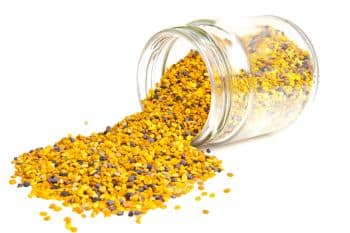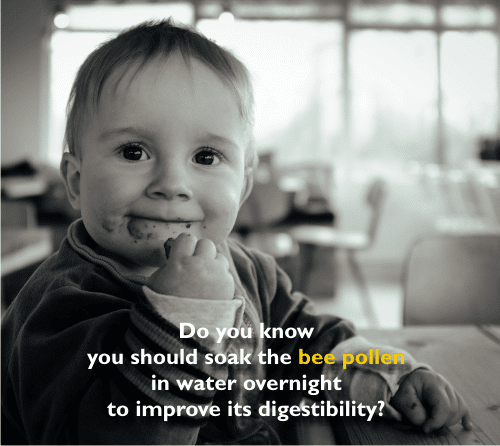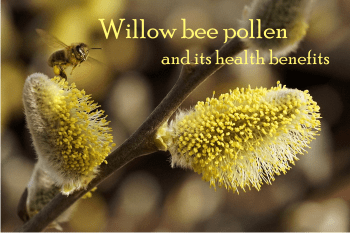Eating honey or bee pollen, containing raw local pollen, in the pre-vegetation season, will prevent or weaken hay fever symptoms. Let’s talk about this.
Spring is such a joy for all of us. It’s like we are blooming ourselves, our bodies feel that burst of energy emerging from beneath the cold. Well, but not all of us can enjoy this. Flowers can be beautiful, but also harmful for some people. And a real nightmare can occur. Swollen eyes, runny nose, sore throat, sneezes. Allergies.
There’s a long way till spring, I know, but we must PREPARE OURSELVES FOR IT!
Let’s all become stronger and enjoy spring as all the lucky ones can. It is possible!
What do the scientists say?
On June 2012, dailymail.co.uk was publishing an article about what really treats hay fever. In it, a doctor, a homeopath and a sufferer were recommending treatments for a condition that brings misery to millions every summer. They offered a series of remedies: antihistamines, decongestants and anti-inflammatories, which included: air filters, vacuums, eye and nose drops, acupuncture, red nasal light, antihistamines, homeopathy and honey.
Here are some products that can calm down the symptoms: Optrex Multi Action Eye Wash, Otrivine Adult Nasal Drops, Dyson DC41, Opticrom Hay Fever Eye Drops, The Saltpipe, Lloyds Allergy Reliever, Bionaire Plus Lifetime Hepa Filter, or our old friend Clarityn.
 Can homeopathy help?
Can homeopathy help?
Yes, here are some of the products it can offer:
Nelsons Nux Vom, 84 pills, £5.45. (Found it here: nutricentre.com) It contains dried, ripe seed of the strychnos nux-vomica tree native to India, which is given for blocked noses and headaches. There has been some positive evidence from laboratory studies for nux vom as an analgesic and anti-inflammatory.
Weleda Allium Cepa 6c, 125 tablets, £6.45, (found in health-store.co.uk) which is in fact onion. Homeopathy works on “like cures like”, so onion, which would produce symptoms similar to hay fever in a healthy person, is given in a tiny and harmless amount, alleviating discomfort.
But, don’t expect anyone to agree in such a diversity of population. After so much time, there are still medics convinced that homeopathy is a placebo and works only if you believe it will do.
Can acupuncture help?
Yes, it can. Through those tiny needles inserted into the skin, the flow of energy in your body will find balance again, and help you get rid of hay fever symptoms.
Europeans didn’t trust Chinese and in 2004 a study in Germany showed that 85 % of patients on acupuncture and herbal medicine showed an improvement compared to those in a placebo group.
Yet, it’s not easy to find a good practitioner, and if you do find it, the treatments are quite expensive.
Is there an immunization therapy?
Yes, Grazax. It contains tablets with grass pollen. Over time, patients become desensitized and hay fever symptoms diminish. The tablets are taken sublingual and for a period of three years, to ensure long-term relief.
BUT:
– You need prescription for it
– The tablets have to be taken daily
– The treatment has to start two months before hay fever season
– It’s expensive, up to £100 a month. Consider buying it three years in a row!
– They give you an itchy tongue! Quite painful.
It comes logical then. If the tables are made of pollen, why not take honey, which is sweet and pleasant, and contains all sorts of pollen? And not only!
Honey. And bee pollen.
Everybody heard of it. Nobody believes it. Yet, people with severe hay-fever tried it and are now fine. That’s real, no mater what medics say. And thus, some beekeepers have put a special name on their product, and began helping people.

Why do the scientists say it can’t work?
Because there are two types of pollen:
1.The most pollen found in honey is the type known as entomophilous, which is pollen dispersed by animals or insects. This pollen is heavier and stickier and does not typically become airborne. Plants and trees that bees forage have this type of pollen and this one is usually not associated with allergic reactions in humans.
2.The allergenic type of pollen is the one taken by the wind from anemophilous plants, which produce light, dry pollen. Such plants produce large quantities of this lightweight pollen, which can be easily airborne and inhaled.
Considering that honey has the type of pollen that doesn’t bring allergic reactions, the scientists say it cannot act like vaccine and help with allergies.
YET, the immune system enhancements brought about by consuming honey are more profound and generalized. And honey should not be resumed only to pollen.
Honey does work:
- There was a report presenting evidence that daily ingestion during winter time of 10-20 g of honey ( 1 teaspoon to 1 tablespoon) resulted in improvements of hay fever symptoms in 16 out of 21 patients. (the study is described in “Honey and hay fever: a report on the treatment of hay fever with honey”, by L. Croft in 1990)
- Munstedt and Kalder reported a positive effect of honey ingestion by means of a questionnaire filled out by 29 beekeepers. (“Honey as a treatment for rhinoconjunctivitis: by Munstedt and kalder, JAAS 2, in 2010)
Bee pollen works too!
Bee pollen is an amazing product. And yes, it was scientifically proven that bee pollen indeed exerts anti-allergic and anti-hay fever effects.
Here are some studies presented by The International Bee Research Association.
1. The test was done using bee pollen phenolic extract and the flavonoid myricetin. Allergy was induced to mice, and the result showed that treating them with 200 mg/kg bee pollen phenolic extract and 5 mg/kg flavonoid myricetin inhibited different allergic reactions. This shows that flavonoid myricetin is one of the flavonoids of bee pollen that is responsible for the anti-allergic effect and it is a potential tool to treat allergy. (The study was published in “Journal of Ethnopharmacology” No.119, in 2008, by Medeiros, Figueiredo, Freire, Santos, Alcantara-Neves, Silva and Piuvezam)
2. In the study “Inhibitorry effect of honeybee – collected pollen on mast cell degranulation in vivo and in vitro“, published in the Journal of Medicinal Food in 2008, the Japanese authors showed that bee pollen inhibited the activation of mast cells, which play a central role in the pathogenesis of various allergic diseases.
3. Grass pollen has already been proven to to be efficient for people suffering from grass pollen allergy and also following bee stings. In a study made on allergic children the treatment done subcutaneously was most efficient. But so were the tablets.
4. In 2008 another study “Specific immunotherapy for common grass pollen allergies: pertinence of a five grass pollen vaccine“, there have been reported good results of a clinical trial where the patients took Gramineae pollen vaccine against hay fever.
5. A pollen based vaccine against birch was also successful.
6. In 2002, Khinchi et al reported “The future of bee pollen sublingually and subcutaneously”.
7. Aqueous pollen extract has been successfully used against house-dust asthma (Wortmann, 1977).
8. Pollysat, a preparation from different bee pollen, was also used for decreasing the symptoms of hay fever (Rimpler, 2003).
Conclusion:
It’s not necessary about creating a vaccine from a specific type of pollen that harms us. Honey is more than this. It was proved to reduce the general symptoms of allergy, and not only of hay fever. It balances the way our bodies react to environment.
Although practice says it works and scientists have started to decipher it long time ago,
“The FDA does not allow pollen marketers in the United States to make health claims about their product because no scientific basis for these claims has ever been proven.”
(to me this translates into “if we cannot explain it, it doesn’t exist.” And I also have another translation, but I choose not to write it here. We all know it.)
More studies have to be done to prove it. More money has to be spent.
Meanwhile, till they decide to approve what’s good for us, try honey and pollen. Even if you are the most skeptical of all people, there really is nothing to lose.
Dosage:
Honey:
For allergy, the reports say 1 teaspoon to 1 tablespoon (20 g) once a day during winter and spring.
For other therapeutic use: adults 50-80 g (up to 4 tablespoons) per day. Children 0.8 to 1.2 g per kg body weight. Best results are seen in 1.5 to 2 months. Considering the high amount of honey, we recommend to decrease the intake of other sweeteners.
A normal intake of 20 to 25 grams of honey per day will lead to long term health enhancing effect.
Bee Pollen:
See page Pollen for dosage and possible side-effects.
If you have bad allergy reactions already, start with a really small quantity. And continue with the medication. Then decrease the medication and increase the bee pollen amount. Give it time, don’t hurry. Your body has to adjust.
Other approaches:
• I have found a very good article about how to treat allergy naturally. It offers some tips on the diet, supplements such as Vit D or Omega 3. If you have those allergy you know better. The article is interesting and can help, too.
• In Japan, Ten Cha (Chinese Blackberry Tea/Chinese Sweet Tea) is very commonly taken for hay fever. It’s very popular and anybody can get it in drug stores or supermarkets.
Do you know anybody who had hay fever and tried honey?
References:
http://www.dailymail.co.uk/health/article-2157014/The-hayfever-treatments-really-work.html;
http://www.myhomeremedies.com/topic.cgi?topicid=92;
Stefan Bogdanov, Bee Product Science, bee-hexagon.net, February 2014;
“What is the future of Bee-Pollen?” Journal of ApiProduct and ApiMedical Science 2 (4): 131 – 144 (2010)
Picture credits:
“jar of bee pollen” by michele91 via BigStockPhoto.com
“hayfeguard jar” http://thehivehoneyshop.co.uk
“sneezing woman” Image courtesy of Stuart Miles at FreeDigitalPhotos.net




Honey has not been scientifically proven to reduce allergies. However, it can still be a tasty alternative to sugary foods. Some people also use it as a cough suppressant. If you have seasonal allergies, you may need to seek medically proven treatment. Examples include over the counter allergy medications or simply avoiding going out as much as possible.
I’ve heard many sources (including my doctor and one of my professors) that have said that local honey improves allergy resistance. I’m not sure of the mechanism of action, but I know that it’s worked on me. Do you know of any good recipes that use honey?
Alex Jennings |
Hi Alex,
I’m glad you solved your allergy problems. It’s true, we don’t need to know the mechanism behind.
As for a recipe, I suppose you mean a food recipe, but I don’t use honey in cooking. It’s such a pity to boil it. Not to mention that the MGO content is increased by heating. I use honey in cocktails or juices, but in cooking I use sugar. That’s because I am lucky and don’t have any disease that would forbid eating sugar, like diabetes.
I might put some recipes here in the future, I don’t know yet. But they will be related to special remedies to treat some diseases. Mixtures of herbs with honey, most probably.
Laura
Laura
Love your site! I love honey so I can’t wait to read all your articles!
Hi Jenny, thank you. You don’t need to read them all. But we all need to replace sugar with honey in our diet. Our body will thank us. 🙂
Laura
Hey Laura!
Thank you so much for writing this post per my request. It was a very interesting article and I’m glad you used multiple studies to back what you were claiming.
I am going to be sure to try eating local honey next winter/early spring! I’ll give you an update to see how it works out.
I really hope it works because my allergy pill right now costs me about $1/day!
Dustin
Hi Dustin,
It’s true, I wrote this post at your request. But I also have to thank you, it’s a very exciting topic and I liked researching it.
I do back on multiple studies, I don’t just write things heard from neighbors, or read on blogs. To have a condition is a serious thing and has to be treated likewise. And, I tend to rely on science as solid foundation and keep my objectivity alive.
Why don’t you start eating raw local honey from now. Maybe with one teaspoon in the morning, and then continue the whole year, and see how you are. Maybe you can find a cheap local beekeeper, this would be of help, too. 🙂
Yes, please let me know how it worked for you.
Laura
Yeah, I definitely will do that. I know there are at least a couple local beekeepers around here. Also, I really like honey anyways. Sometimes I will just take a spoonful of honey simply to take care of my sweet tooth. I figure it’s much better to do that than go buy a candy bar!
Dustin
Absolutely! Only that you should take honey on a regular basis, like a habit. 🙂
Good luck!
Laura
This post caught my eye because I was literally drinking lemon honey water while reading this. For the past few days, my nose has been running like crazy. Now that drank some honey, I do feel a lot better. Cheers to your research and good information.
Hi, Win. If you take one remedy for several days, and nothing happens, it is better to change it. Try honey and cinnamon. Or alternate them. And remember that you can take larger quantities of honey these days. As a rule, it’s 1 g of honey per kg body weight. And a spoon has 21 g. But for a couple of days we can take more than that. 🙂
Much health and blessings!
Laura
Hi Laura, Excellent page with so much great info for one to use! I love organic raw honey and this page inspires me to eat more of it. Thanks for all this great info!
And I thank you for visiting this site. I will always encourage eating honey, even if you are as healthy as possible! It will do only good.
Laura
Hi Laura, great post once again 🙂
But a huge question pop in while reading this, and perhaps it is not as related as it should be, but my mind connected the dots and so, here is the question.
What about eczema? Can honey help too? And we are talking about consumption and eventually, hopefully, cure!
Hi McKing,
Eczema, like asthma and hay fever are allergic conditions that are triggered by our immune system. Eating honey will definitely help with the immune system and thus with all allergies. Yet, when trying to heal with natural products, we should not expect a cure to happen over night. It takes time and consistency, not to mention that the person should also work with his/her inner-self. A disease is an imbalance. Energetic, emotional, mental… Herbs and honey also work in finding balance in those planes as well. But it takes time and perseverance, as I said.
To treat the eczema locally, there are many creams and ointments that include honey. A very good one is made of honey, olive oil and beeswax. Perhaps I’ll make a post about this, too. It’s a good topic.
Laura
I don’t personally have hayfever but I will point some members of my family this way as we do have a few sufferers in the family – and every year it gets them badly!
There’s some great info here that I’m sure they will find invaluable – thank you for sharing this with us 🙂
Thank you, Kelly. It is a pleasure to myself to discover honey and always be surprised. Thanks for the visit.
Laura
I think there’s nothing to lose just by having a tsp of honey everyday of winter! I actually would enjoy it a lot!! Winter will get sweeter now 🙂 I will definitely follow your recommendation Laura. Thanks a lot! Super complete post btw!
Absolutely nothing to lose, Andrea. And a lot to gain. Sweet happy winter!
Laura
Laura – Excellent information. As a boy, I suffered hay fever so badly in Michigan in August/September timeframe that when I woke up in the morning, my eyes would often be glued shut. It took cold, wet compresses to get my eyes open. Miserable!
Fortunately, age cured that and I haven’t suffered with it as an adult. But I know others who do. Thanks for this great post.
You are a lucky boy! Good for you. Anyway, yes, tell the others who are not that lucky. 🙂
Laura
It is swinging over to spring here in South Africa, and I’ve been looking everywhere on the internet for cures for my allergies. Sinus brings me down, but I’m sure honey will cheer my right back up. I’ll give it a try!
Thank you for the great post Laura.
Lee
Hi Lee, I hope you still have at least one month till the allergy season, because honey has to be taken with three months in advance. If you do take it now and it doesn’t work this spring, please remember to begin the treatment since autumn, next year.
Laura
Great post. I have found local honey an bee pollen to be very beneficial for my allergies and many of my patients.
Thank you for confirming this, from direct sources. This will raise the trust of people. Not many doctors agree of the benefits of honey.
thanks again.
Laura
great read, thanks for sharing. really good article, references mean a ton to me and you did your home work will be sharing, thanks once again
Dr Steve Knighton
Thank you, doc. I do try to do my best to offer quality. Laura